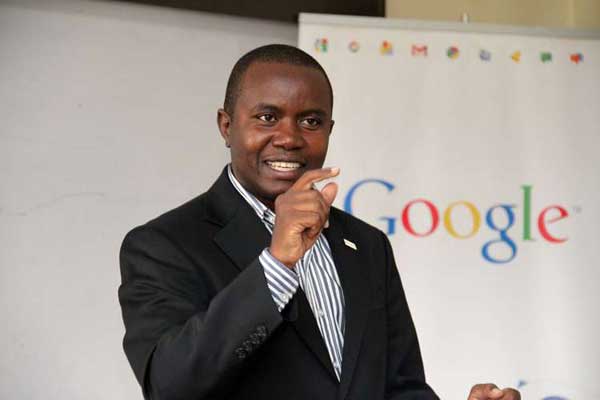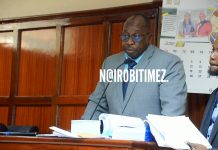
Information Communication and Technology Cabinet Secretary Joe Mucheru.
BY THOMAS KARIUKI
The Government will ensure ICT access to all persons living in the Kenya, Information Communication and Technology Cabinet Secretary Joe Mucheru has said.
It is out of this conviction that the Government undertook institutional reforms of the sector to encourage competition and private sector participation in infrastructure development with a view to ultimately closing access gaps, he added.
Speaking today during the launch of a report of the ICT access Gaps study in Nairobi, the CS said that through Universal Service Fund in 2009 the Government envisaged leveraging operations in high cost areas including rural and remote areas.
“We are fortunate to have a very well-conceived legal framework for the Fund and we should therefore be able to make tremendous progress in making ICT services accessible to the widest number at the most affordable cost”, he said.
Mucheru added that the report of the access gap study will be instrumental in the prioritization of the implementation of projects and will shape the ICT landscape in Kenya.
“The launch of this report is timely as it forms a very critical ingredient in the efforts to accelerate the deployment of communication services to all parts of the country, in an objective and coordinated manner”, he added.
The CS confirmed that the Government continues to direct investments towards ICT infrastructure development so as to ensure connectivity throughout the country saying the Ministry has embarked on policy reforms, placed emphasis on public-private sector partnership, as part of the overall government plan under Vision 2030.
“Focus is being directed to innovation as we strive to meet the demands of ICTs in servicing other sectors of the economy and making every effort to ensure diffusion of ICT in its quest to deliver efficient public service to Kenyans is key as demonstrated in the Huduma Centres” he said .
The CS noted that the importance of studies like the one that was launched today cannot be gainsaid as it gives policy makers and industry players the much-needed confidence in overseeing the development of the sector.
He emphasized that it unacceptable that some Kenyans are yet to enjoy the benefits associated with connectivity to ICT services saying the report will give a clear picture of the areas where citizens have not enjoyed benefits of liberalized and accessible communication services.
“We have embarked on the review of the ICT sector policy to align it with emerging technological changes”, Mucheru said noting that the digital economy holds huge potential for growth and ICTs will be expected to play an important role in providing economic opportunities especially to marginalized communities and other vulnerable groups.
Universal Service Advisory Council (USAC) Chairperson Dr. Catherin Ngahu also said that according to the report, there are areas that still need basic communications services and that will remain a priority as the council set out in operationalizing the fund and ensure that t the existing gaps are covered within the shortest time possible.
She said that the contribution to the Universal Service Fund (USF) currently stands at Kshs 3.94 Billion out of which the Authority has contributed One Billion adding that part of the Terms of Reference of the consultant for the ICT Access Gaps Study Report is to work with the Authority in developing the tenders for the initial projects.
“We expect this work to begin immediately so that we can advertise the tenders at the beginning of the next financial year and award tenders by November 2016 and for this reason, we have set we have set aside Sh1.5 Billion for the implementation of the initial USF projects which will include telecommunication infrastructure development to expand voice services coverage and schools broadband connectivity”, Dr Ngahu said
Andrew Dymond, the research study Team Leader said the report identifies the areas requiring Universal Service Fund (USF) support and the gaps in the communications services namely, voice communication services, broadband coverage, postal and courier sector and broadcasting.
He noted that the regional disparity for 3G is more pronounced than for 2G, even though the population coverage has improved significantly in recent years and will continue to expand through market forces, especially as 3G devices become more affordable and popular.
“Every County in Kenya has at least one population center with 3G coverage, except Isiolo County which today has zero percent 3G coverage. Analysis by sub-location indicates that 1,244 sub-locations country-wide have zero 3G coverage and a further 977 have less than 50 percent coverage”, Dymond said.






